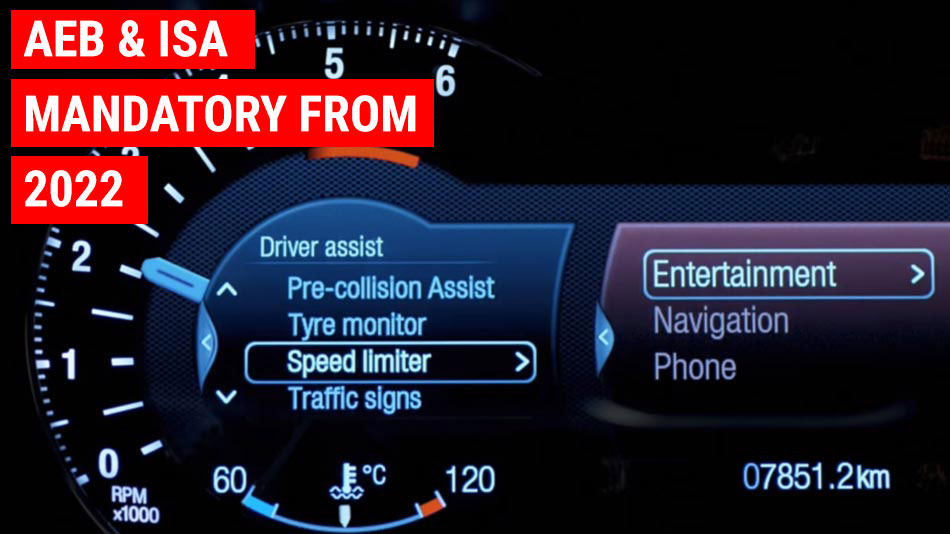- Tyre pressure monitoring systems (TPMS)
- Intelligent speed assistance (ISA)
- Drowsiness and attention detection systems
- Speed limit information (SLI)
- Lane keeping assistance (LKA) and Lane departure warning (LDW)
- Autonomous emergency braking (AEB)
- Electronic stability control (ESC)
- Anti-lock braking systems (ABS)
https://roadsafetyfacts.eu/active-safety-systems-what-are-they-and-how-do-they-work/
All new cars in the EU could have speed limiters and breathalyzers as of 2022
PLEASE, go directly to the link to do these exercises:
https://forms.gle/LFxEqioUwm2yGGuy6
All new cars in the EU could have speed limiters and breathalyzers as of 2022
The European Union has agreed on new rules stating that all cars built after May 2022 and sold in the European Union will have built-in speed limiters, as well as breathalyzers that won't allow driving if the driver is intoxicated. The European Parliament is expected to ratify the new regulations in September. The UK, which may not be part of the European Union by then, will nevertheless adopt the new rules as well.
The list of new mandatory safety features for cars is actually much longer, and includes some increasingly common features like lane-keeping assistance, advanced emergency braking, a built-in data recorder, drowsiness and distraction monitoring, and camera/sensors help when reversing.
"With the new advanced safety features that will become mandatory, we can have the same kind of impact as when the safety belts were first introduced. Many of the new features already exist, in particular in high–end vehicles. Now we raise the safety level across the board, and pave the way for connected and automated mobility of the future. But the features that will likely get the most attention are "alcohol interlock installation facilitation" and "intelligent speed assistance." The former typically requires the driver to blow into an in-car breathalyzer before starting the car. If the driver's alcohol level is too high, the car simply won't start. The details of the system that will be mandatory in EU cars are scarce at this point. The latter feature uses GPS as well as a built-in sign recognition system to detect if the car is going over the speed limit. Then the system will warn the driver and automatically slow down the car. However, the driver will be able to override this by pushing on the accelerator pedal.
You will have to answer the question using the link provided. To access the test, you need to indicate your name, group and email (whatsyourname@iescantabria.net). All the activities are compulsory to move on the form questionnaire and should be filled before FRI 3rd April 23´59h. (NO emails will be sent this week, just filling the form). Integrated skills includes video-listening, reading comprehension and speaking activies with Vocaroo to be sent via Google Forms. If you have questions, we´ll meet online again on Wed at the time scheduled which will be published on the blog. You are doing GREAT. Hope you are all fine and enjoy this English practice.
https://forms.gle/LFxEqioUwm2yGGuy6
Speaking section. Answer the following questions according to the information from the text.
1. Which cars will have to follow the new rules?
2. What will be the most significant systems fitted to cars?
Question 5: Reply and record your answers about 3 of the following questions. You will have to send the link (not the file) of the Vocaroo recording to your teacher.
1. Which cars will have to follow the new rules?
2. What will be the most significant systems fitted to cars?
Question 5: Reply and record your answers about 3 of the following questions. You will have to send the link (not the file) of the Vocaroo recording to your teacher.
- What are some of the advantages and disadvantages of driving in compared to using public transportation?
- Are there speed limits in your country? If so, what is the average speed limit?
- Do you have a bicycle? If so, when did you get it? How much did it cost? How often do you ride it? What color is it?
- Do you ride a bicycle more than once a week?
- Do you often ride public transportation during rush hour?
- Do you often use public transportation?
- Have you ever been in a traffic accident?
- Have you ever been stopped for speeding? (Have you ever gotten a speeding fine?)
- Have you ever missed your last train or bus home? If so, how did you get home that night?
- How do you get to school? How long does it take? How much is the bus fare or the train fare?
- How do you think countries can reduce congestion on the roads?
- Is there any environmentally-friendly transportation in your area?
- What do you think is the most dangerous form of transportation? Why?
- What do you think is the safest form of transportation? Why?
- What kind of transportation do you use most often?
- Do you sometimes take a taxi (cab)?
- How do you "call" a taxi in your country from the side of the road? (ex. raise your hand in the air, etc.) Is it expensive to take a taxi in your country? Are there seat-belts in the taxis? Is it common to give the cab driver a tip? If so, about how much do you give?
- How important do you think it is to use public transportation?
- Do you think that governments should encourage public transportation more?
- Do you think city governments should discourage use of privately driven cars within city limits?
- Do you have good public transportation where you live?
- How could public transportation in your city be improved?
- Do you think that we ought to be obligated to drive electrical and solar powered vehicles?
- Is the public transportation in your city efficient?
- Is public transportation in your city too expensive?
- If public transportation were free, would you use it more?
- Do you feel safe when you use public transportation?

No comments:
Post a Comment